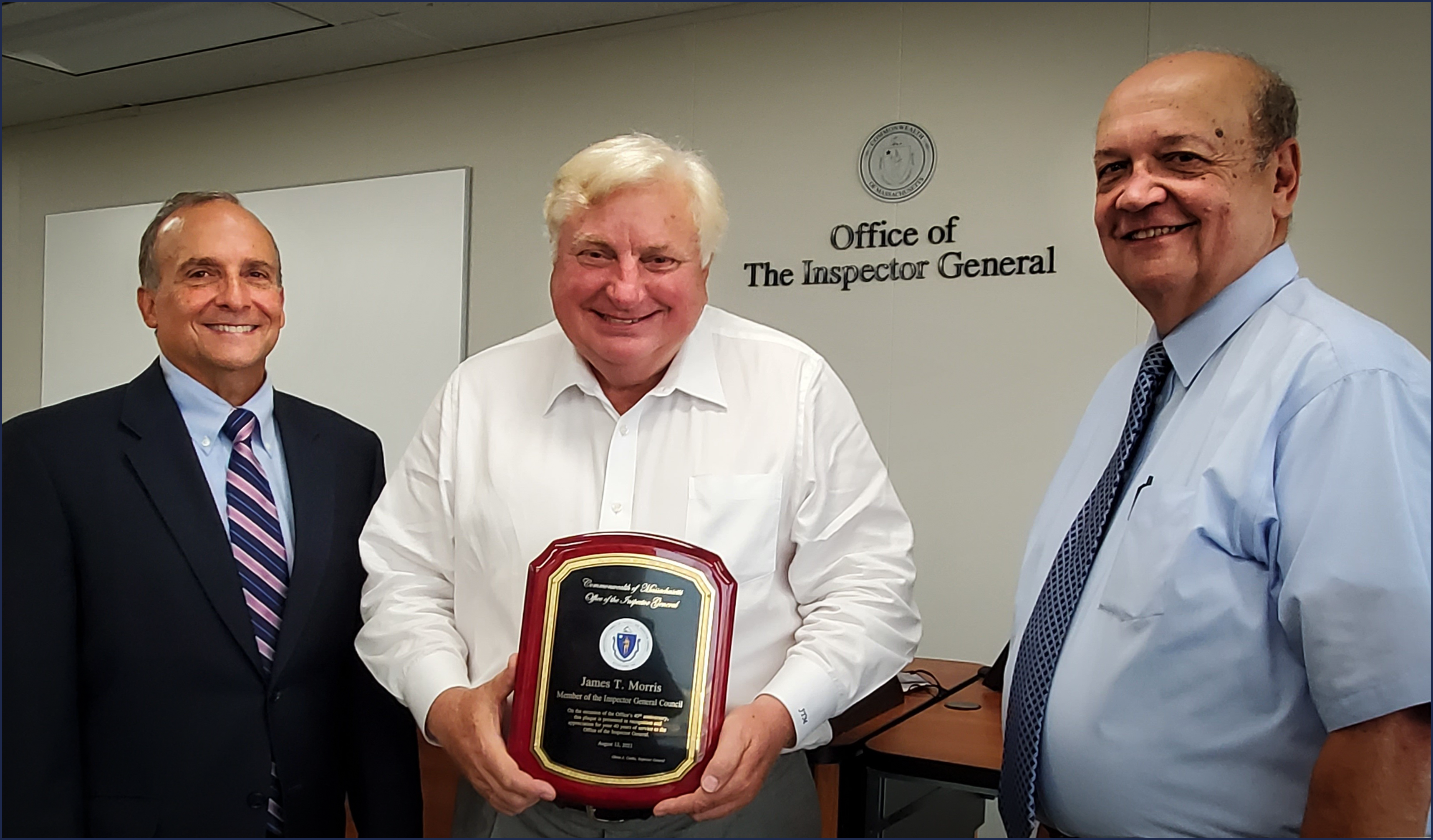Jim Morris Reflects on 40 Years on the IG Council
Morris, an attorney, is a founding partner of the Boston law firm Quinn and Morris. In 1981, then-Attorney General Francis Bellotti named Morris to the seat designated for a private sector attorney on the inaugural Inspector General Council. The Inspector General Council, created by statute, advises the Inspector General in carrying out the duties and responsibilities of the Office. See M.G.L. c. 12A, § 3. An unbroken succession of appointments to the Council every three years since 1981 has given Morris a unique vantage point on the Office’s evolution and activities.
“Joe Barresi was a delightful guy and deserves a lot of credit,” Morris said during a recent interview. “The day he was sworn in and walked in the door, he didn’t so much as have a typewriter, piece of paper or anything, simply a desk. I don’t think he had a phone.” But he successfully staffed and equipped what was the first statewide inspector general’s office in the nation.
By statute, the Inspector General Council must authorize OIG requests for subpoenas for sworn testimony. See id. at § 15. In the beginning, the Inspector General Council helped shape how the Office conducted investigations by enforcing certain standards for approving subpoenas and reined in some requests that lacked adequate justification. Morris stated that in recent years, “We’ve almost never said ‘No,’ but in the early days, we did.”
IG Barresi was followed by Robert Cerasoli and then Greg Sullivan, each a former state legislator who had chaired the House Post Audit and Oversight Committee. Morris explained how the scope of the OIG grew over time, largely in response to directives from the Massachusetts Legislature. The Legislature added language to bills mandating that the OIG review certain contracts and property transfers and also commissioned in-depth policy studies by the OIG on matters like health care spending. Beginning about a decade ago, the Legislature created and funded specialized units within the OIG focused on the state Department of Transportation, the Executive Office of Health and Human Services and the Massachusetts State Police.
Glenn Cunha, now in his tenth and final year as IG, has built on the foundation laid by his predecessors and “taken it to another level,” according to Morris. “It’s an extremely well-run agency that punches well above its weight in terms of budget. An awful lot of work comes out of here for a little bit of money.”
The OIG “provides a huge benefit to the Commonwealth,” Morris said. “Its investigative arm provides a check on corruption, detecting criminal misconduct involving public officials and contractors defrauding state or local agencies. Those efforts often recover funds on behalf of the affected entities, which ultimately benefits taxpayers.”
Morris thinks the Office’s educational activities have a lower profile with the general public but probably provide a bigger financial payoff than the recoveries from investigations. Answering questions from public procurement employees through the Chapter 30B Hotline, teaching classes on competitive bidding and other educational programs ensure efficient use of public funds. “There are many, many millions [of dollars] more of waste that hasn’t taken place because public employees are trained in bidding, contract management, internal controls and fraud detection,” Morris said.
Morris was recently reappointed to another three-year term on the IG Council. He is certain the Office itself is on course for continued success. “The model that exists today is the one that’s going to be followed for a long time. It’s working quite well. The amount of work generated out of this office is really impressive.”
Contact for OIG Bulletin, October 2021: A Conversation with Jim Morris, the IG Council’s Longest Serving Member
Phone
Open from 9:00 a.m. to 5:00 p.m., M-F
Address
| Date published: | October 25, 2021 |
|---|
